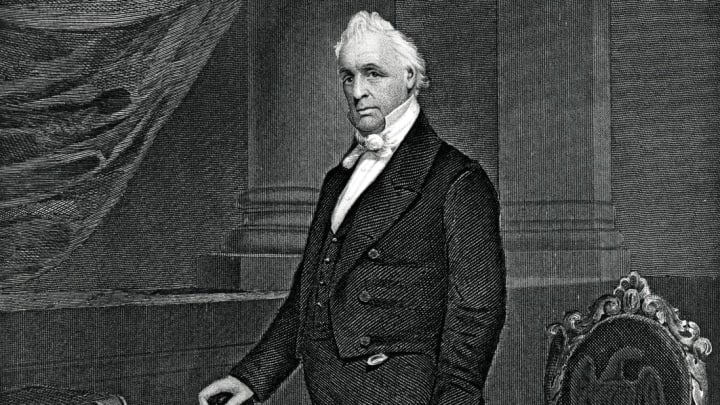Washington, D.C., didn't have a modern sewage system in the mid-19th century, and this may have had historic implications for the health of the country's leaders. The deaths of presidents William Henry Harrison, James K. Polk, and Zachary Taylor have all been linked to contaminated drinking water at the White House. According to a study from Gettysburg College [PDF], sewage at the nearby National Hotel nearly prevented another president from being inaugurated.
James Buchanan spent the weeks leading up to his inauguration in 1857 recovering from the infamous National Hotel disease. In the 1850s, the hotel was a favorite destination of D.C.'s elite politicians. The opulent lodgings were conveniently located on Pennsylvania Avenue between the White House and the Capitol building. When Buchanan needed a place to stay in Washington before becoming president, the National was a natural choice.
On January 25, 1857, President-elect Buchanan and eight companions checked into the National Hotel. A physician in his party was the first one to come down with the illness. After going to bed that first night, Dr. Jonathan Foltz woke up nauseated and in pain. Buchanan and the rest of the group soon found themselves in a similar situation. Their symptoms included vomiting, diarrhea, abdominal cramps, and swollen tongues.
In the time surrounding Buchanan's inauguration, the National Hotel sickness afflicted some 400 guests. Nearly three dozen people died of the disease, including Buchanan's nephew and secretary Eliot Eskridge Lane and three congressmen. The culprit was the hotel's unsanitary sewage system. Frequent cold snaps during the winter of 1857 would have caused pipes to freeze and thaw several times, increasing the likelihood of leaks. Today, experts believe sewage from the hotel somehow contaminated the food or water there, causing a deadly epidemic of dysentery.
Because many of the victims were politicians, conspiracy theories naturally abounded. Newspapers speculated that the National's water supply had been poisoned with arsenic in an attempt to assassinate the president-elect. National tensions were high following Bleeding Kansas and the Missouri Compromise, and some journalists placed the blame on radical abolitionists.
Assassination fears weren't enough to rattle James Buchanan. After weeks of on-and-off symptoms, he made the ill-advised decision to check into the National Hotel a second time prior to his inauguration in early March. The epidemic was still raging at that time, but it didn't stop Buchanan from entering the White House. He recovered in time to deliver his inauguration address on March 4, 1857.
